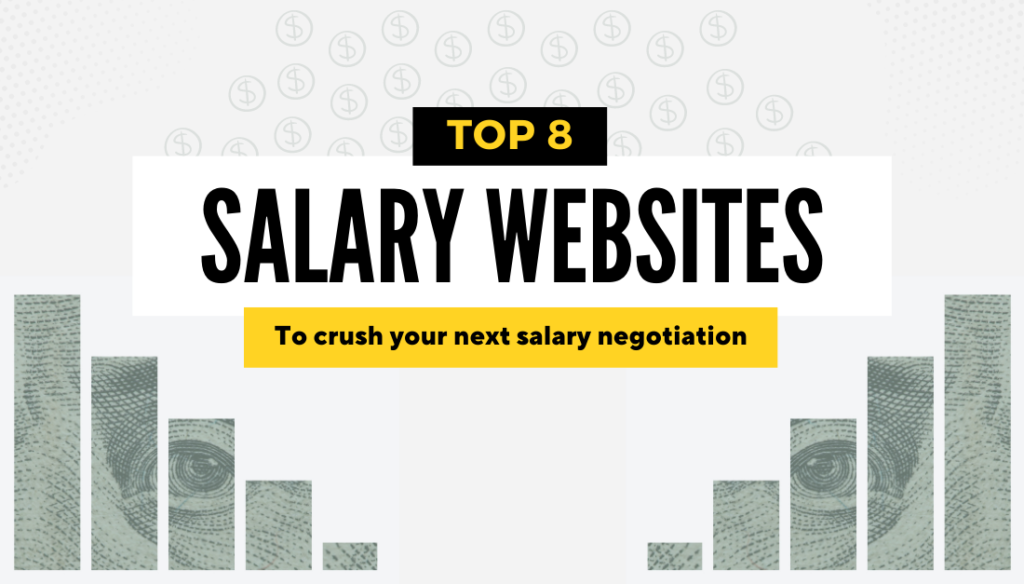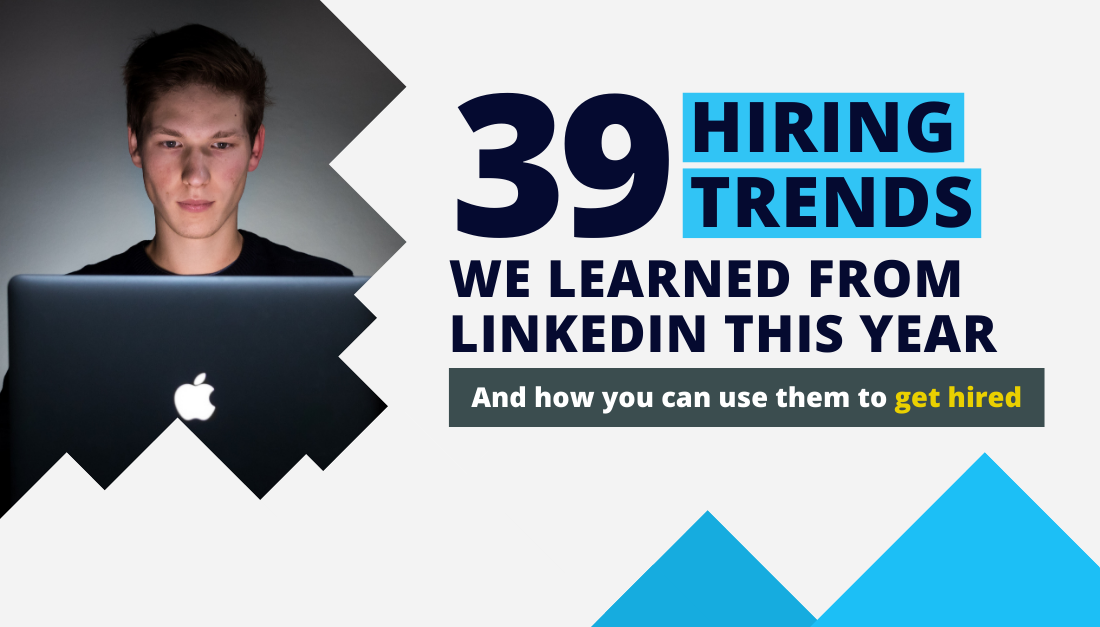
39 Hiring Trends for 2023 We Learned from LinkedIn Polls This Year
Hiring trends are notoriously deceptive. One year the hot thing is free snacks and ping pong tables, the next year it’s unlimited paid time off.
While there is value in industry reports, sometimes the best insights can come from the LinkedIn community itself. In this post, we’ve gathered some of the most interesting hiring trends based on dozens of polls shared by LinkedIn users throughout the year (and a few reports too).
Below, we’ll share advice to some serious career questions, such as:
- Will job hopping hurt your chances of landing a job?
- Is it okay to tell an employer you left your previous job due to burnout?
- Is it harder to land a remote job than a non-remote job?
- What’s the fastest way to get a promotion?
- Is it better to network for a new job or apply online? (this one may surprise you).
We’ll also share answers to a few fun questions as well, such as:
- What do people find harder dating or job searching?
- What’s the worst career advice you’ve ever been given?
- What’s a fun way to answer, “what’s your biggest weakness?”
- What do people see in a field of dandelions?
It should be noted that the data collected below comes from different polls. Each poll was served to a different audience and had a different number of responses. In each poll you can see the sample size in the bottom left corner.
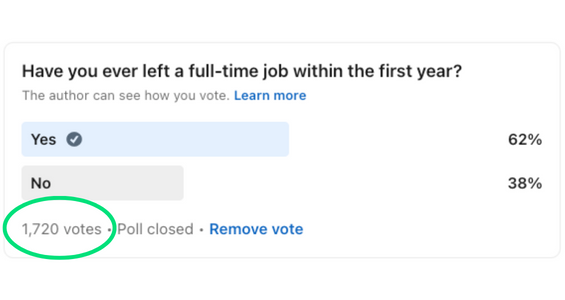
We’ve highlighted any polls that have a low response rate (under 100 responses). The goal of this list isn’t to make any definitive claims, but to help us question our assumptions, encourage our endeavors, and get a sense of what the LinkedIn community thinks.
So, without further adieu, here are the hiring trends we found from over 35 LinkedIn polls this year:
TABLE OF CONTENTS
Hiring Trends for Job Hopping

Job hopping isn’t as big of an issue as it used to be
One of the biggest fears people have when it comes to leaving their jobs is whether they’ll be seen as a “job hopper” or not. While no one has precisely defined what constitutes someone as a job hopper, the general consensus was that it’s someone who stays at their job for just 1 year.
I polled my community, which includes many hiring managers and recruiters, to find out if there’s any truth to this fear. According to the hiring poll:
64% of people surveyed said they would hire a job hopper.
And, an additional 24% said they would hire a job hopper as long as they had a good reason for leaving their previous job.
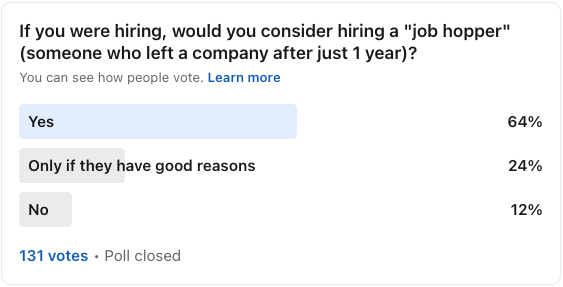
Most people change jobs every 1–3 years
It seems that job hopping is also becoming the new normal too. According to a poll by Biron Clark, Founder of Career Sidekick, most people are changing jobs every 3 years or less. According to the poll:
42% of people surveyed change their jobs every 1–2 years.
23% of people surveyed change their jobs every 3 years.
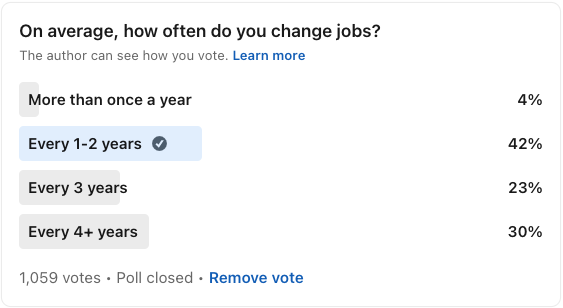
If you’re considering changing your job, remember that timing can be important. According to hiring trends, the best month to apply for a job is either January or February. This also seems to be the peak hiring season as well.
Many suspect this is because during those months hiring managers have figured out their budgets and are ready to grow their teams (unless a recession is looming, but more on that below).
Many people leave their jobs even in the first year
In fact, it seems that many people are a lot less likely to “tough it out” in a job they don’t like. According to another poll by Biron Clark, almost 2/3 of people have left at least one job within the first year of starting it. According to the poll:
62% of people surveyed have left a full-time job within the first year.

Leaving your job due to burnout is totally okay
After the pandemic, a lot of employees were feeling stretched thin and feeling burnt out. This led to a lot of employees quitting in what’s known as “The Great Resignation” or “The Great Reshuffle.”
It seems that employers are becoming a lot more understanding of burnout nowadays. Resume writing expert and Founder of Briefcase Coach, Sarah Johnston, discovered this in her latest poll:
65% of people surveyed said they would not raise any red flags if they found out an employee left their last position due to burnout.
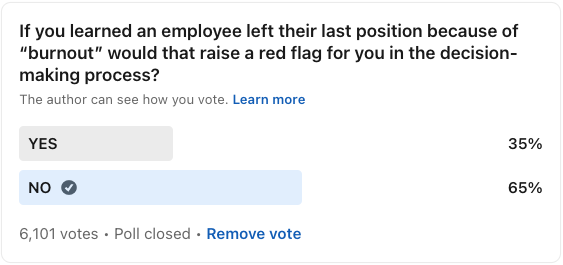
Most people did not benefit from “The Great Reshuffle”
“The Great Reshuffle” was a period of high turnover following the pandemic. During this time many employees quit their jobs and wanted to figure out how to start a new job or career. Meanwhile, employers were desperate to hire employees they had let go or lost during the pandemic.
While there were plenty of news stories about The Great Reshuffle, it seems that many people didn’t actually benefit from it. Andrew Seaman, Editor for Jobs & Career Development at LinkedIn, found out the following hiring trends in his poll:
47% of people surveyed said they did not benefit from “The Great Reshuffle” compared to only 37% of people who said they did.
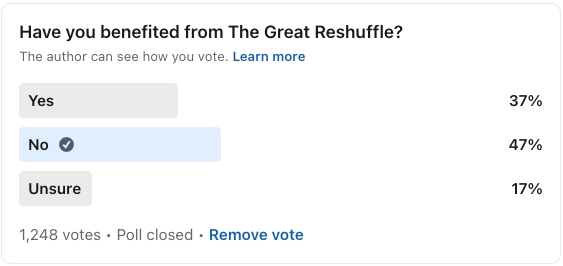
Most people have been laid off at least once
The big headlines this year have been about the thousands of layoffs occurring across seemingly all industries. Even big tech companies, such as Meta and DoorDash, are cutting thousands of employees.
Being laid off can be one of the most stressful things that can happen to you. There are several steps you should take if you’ve been laid off, (such as negotiating your severance package), but what’s important to keep in mind is that you’re not alone. In fact, LinkedIn Coach, Andy Foote, found out some surprising stats in his poll:
61% of people surveyed have been laid off at least once in their careers.
22% of people surveyed have been laid off 2–3 times.
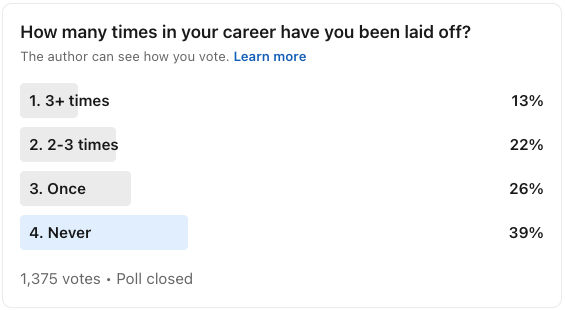
Most people believe that learning from a career setback is best
Whether you’ve been laid off, passed up for a promotion, or his another roadblock in your career, career setbacks are inevitable.
The question then becomes, “what should you do after a career setback?” LinkedIn set out to find out what people found most helpful in their recent career poll. Here’s what they found:
55% of people surveyed said that learning from a career set back and moving on was most helpful.
23% of people surveyed said that focusing on friends and family after a career setback was most helpful.
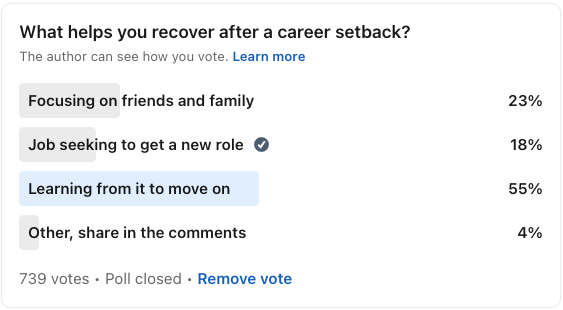
Hiring Trends About Career Values

Each generation has unique employment values
Making generalizations about different generations can be tricky. After all, every generation is made up of millions of people with vastly different backgrounds.
However, LinkedIn did try to put together a few notable insights about what each generation is looking for from a prospective employer. In their synopsis, they found the following patterns:
77% of Gen Z said that they put an organization’s values as their top concern when choosing an employer.
70% of Millennials said they would leave their employer for better fertility benefits.
Gen X puts healthcare at the top of their list when it comes to what they value most of out of a company.
Baby Boomers said they want the “traditional” benefits — health, vision and dental coverage, along with pension plans.
Learning new things is the #1 workplace desire
Some workplace desires are universal, however, such as the desire to learn. When I polled my audience about what is most important when it comes to work, a strong majority said that they wanted to learn.
This finding is similar to what LinkedIn’s Workplace Learning Report found as well. Here are the results of my poll:
56% of people surveyed said that learning new things is the most important thing they want from their work.
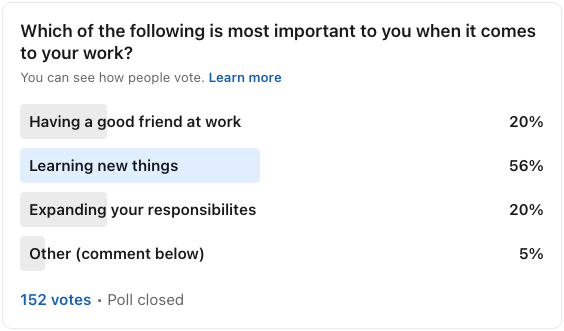
Most people would rather have a dream team than a dream role
There are countless articles that talk about how to find your dream job, but this latest poll revealed that maybe the key to happiness may be different. Here is what people had to say when asked which career “dream” they would love to have most in this career poll:
46% of people surveyed said they would love to work with a dream team.
33% of people surveyed said they would love to work in a dream position.
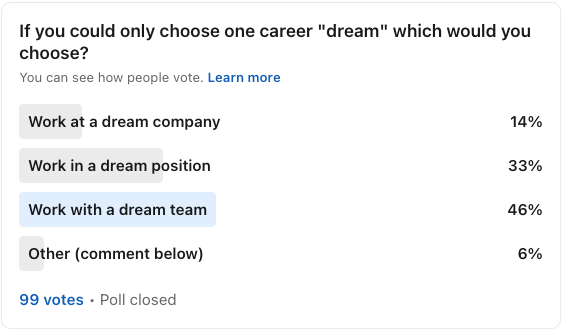
People want remote jobs, but there aren’t enough
Another consequence of the pandemic was the move to remote work. When the shift to remote work started, many people struggled with adjusting to this new way of working. There were several reports of loneliness and burnout, for example.
It seems, however, that sentiment may be changing. According to The Washington Post, even though companies are calling employees back into the office, many of them don’t want to go.
In recent data from Axios, it was reported that:
50% of job applications submitted on LinkedIn are for remote jobs.
But only 15% of jobs listed are remote/hybrid friendly.
It seems that a big hiring trend is how more people than ever are competing for the few remote friendly jobs available. It seems job seekers will need to be on top of their game when it comes to their resumes & interview skills.
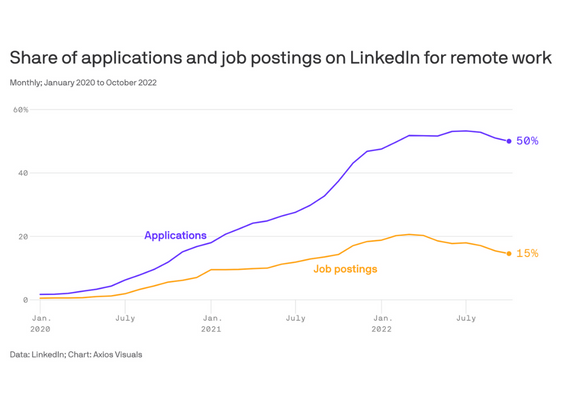
Most people believe it's okay to secretly have 2 full-time jobs
Part of the reason that remote jobs may be in short supply, is because some people are holding more than one. Remote work has opened a unique opportunity for ambitious workers to make the most of their skills. Namely, some people are holding two full-time jobs at the same time.
When I asked my community about what they thought about this hiring trend, here’s what they had to say:
43% of people said it’s perfectly okay for someone to have two full-time remote jobs secretly.
33% of people said that it’s okay for someone to have two full-time jobs, but only if they disclose them to their employers.

Most people say “medium wins” are the best way to get a promotion
With inflation rising, many employees are looking to get promotions and raises this year. The natural question to ask then is, “what’s the best way to get a promotion?”
In a poll I ran this year, I wanted to find out what type of work people believe is best for getting a promotion. Is it small “wins” done every day? Is it medium wins done occasionally? Or should you work on getting just one big win every year? According to the poll:
49% of people surveyed believe the best way to get a promotion is with medium-sized “wins” done on a monthly basis.
(Note: the sample size of this poll was only 49 people, so take this one with a grain of salt)
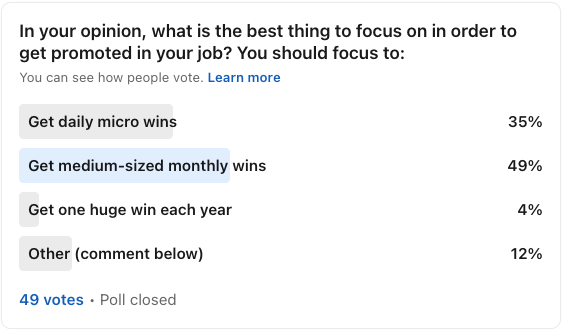
Most people track their wins
Speaking of wins, one of the things most job seekers struggle with most is writing great bullet points for their resumes. The best way to write solid bullet points for your resume is by using some of your “wins” that you’ve accomplished throughout the year.
It seems that most people are catching on to this strategy. Claire M. Davis, voted top career coach and a “LinkedIn Top Voice,” discovered the following in her poll:
40% of people surveyed track their wins regularly.
And 41% of people surveyed track their wins, but not routinely.
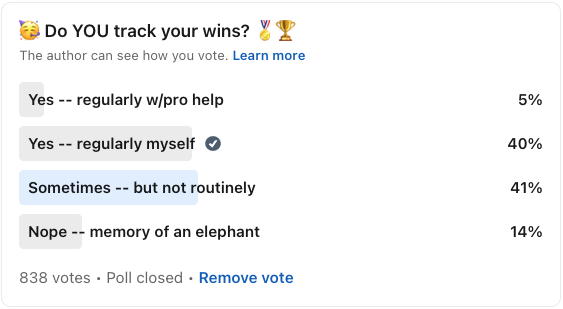
If you don’t currently track your wins, I highly recommend you do so. Here is a helpful video by Gillian Kelly, Head of Talent Marketing at The Career Agency:
One of the most helpful tools for tracking your wins and keeping your job search organized that I've found is Teal. Teal is a job search organization tool that let's you save jobs, auto-generate a resume, and a lot more.
(As a bonus, it also write bullet points and achievements for you using AI!)
You can try Teal for free by creating a free Teal account here (no credit card required)
Most people would drop a current job offer for a new job offer
One of the big questions that has been debated over the last decade is about job loyalty. As we’ve seen record layoffs, a lot of employees have started to question whether company loyalty is even a thing anymore.
It seems that the old days of companies sticking with their employees and vice versa may be older. Austin Belcak, CEO of the job search site Cultivated Culture, captured this sentiment perfectly in his career poll:
When given the opportunity, 90% of job seekers would drop a job offer they’ve already accepted in favor of a better offer.
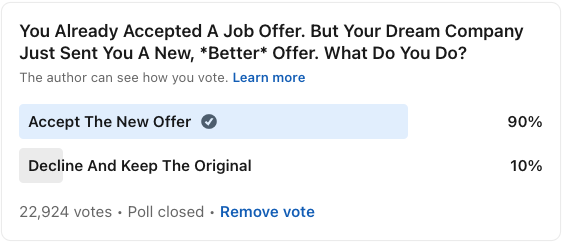
Trends for Job Search Strategy

To improve your chances of being hired: be early & have a referral
It appears that when it comes to landing a job, timing may be more important than we thought. Brand Marketing Executive and AdWeek Top 50 Marketer, Bryna Corcoran, recently shared an eye opening analysis her previous company ran.
In the analysis, the company took a look at the last 5 years of hiring data. They analyzed the people who actually landed offers and they found:
Applicants who applied to a job in the first 24–72 hours of it being posted, were 90–95% more likely to land an offer.
Interestingly enough, 84% of the candidates from the 72 hour pool also had an employee referral.
It appears that “the early bird gets the worm,” is a very real hiring trend. Bryna Corcoran suspects that:
“Managers are excited and more likely to review resumes in the first week because that headcount and budget they fought for last year is finally materializing. But, they are timed starved, and quickly run out of steam as their “day job” duties beckon. They move the 72 hour pool forward to keep momentum going and get back to their day jobs.”
So, knowing this, how can we improve the chances of getting hired?
Two job search strategies:
- Make sure you’re one of the first applications in the hiring pool. You can do this by using LinkedIn’s advanced job search features here.
- Work to expand your network and increase your chances of getting a referral. You can learn about how to network for a job here.
Talking to hiring managers & networking can help your job search
Many job seekers are shy about messaging hiring managers (I know I certainly was). But, this may actually be a huge missed opportunity.
Top job search expert, Katelyn Richards, recently ran a poll where she asked her community what they found worked best for their job search. According to the hiring poll:
42% of people surveyed said that going directly to the hiring manager was most helpful to getting hired
45% of people surveyed said that networking aggressively helped was most helpful to getting hired
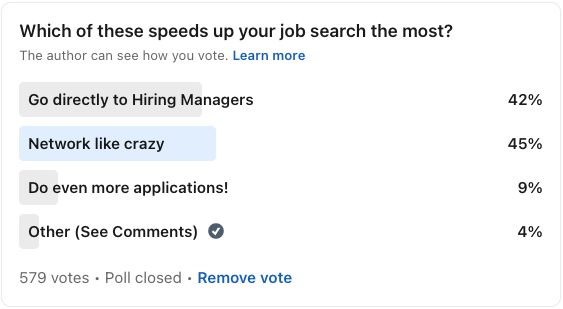
Applying to jobs online can be just as effective as networking
One of the most controversial topics amongst hiring experts is: “what’s better, applying for jobs online or networking?”
There have been several studies that claim that networking is far superior to applying online, but these studies may be misleading. At GHYC, we’ve personally found that applying for jobs online is just as effective as networking if you have an optimized resume and use the best job search sites.
According to several polls, it seems that networking and applying online are equally effective in this regard. One hiring poll found that:
48% of people surveyed landed their most recent job by applying online.
44% of people surveyed landed their job through networking or a referral.
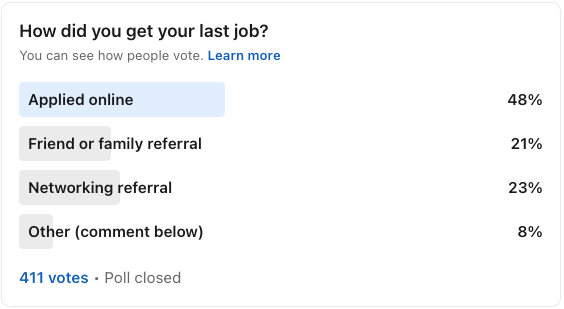
Career Advisor, Ana Lokotkova, found that applying to jobs online is just as effective as networking in her hiring poll as well:
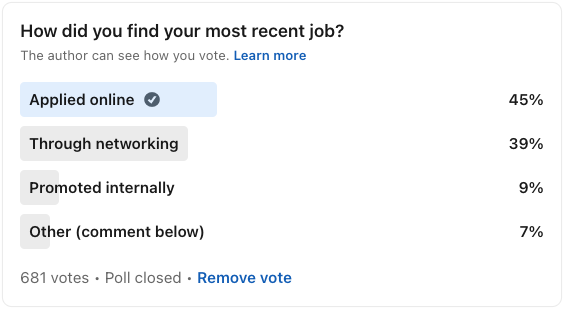
It turns out very few people actually have a good resume
Writing a resume is a very difficult task. I should know, it took me over 14 months to figure out how to write a good one.
If you’ve struggled with writing your resume, don’t worry, you’re not alone. Bob McIntosh, voted LinkedIn Top Voice in 2019, had a surprising discovery in his resume poll:
56% of people surveyed said very few resumes they've read were well-written.
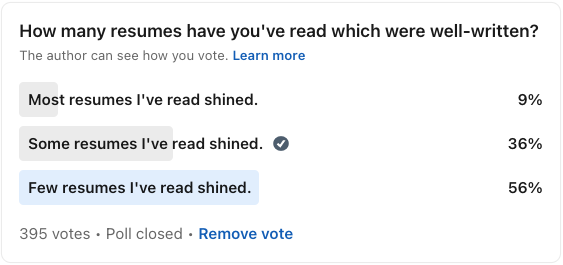
Most people believe their resume is nearly there
There may be a discrepancy between how good job seekers believe their resumes to be and how good their resumes actually are. According to my resume poll:
45% of people surveyed said their resume is 90% complete or almost there.
And a surprising 27% said their resume is 100% perfect and that they receive lots of interviews.
(Note: This poll only has 51 votes, so take the results with a grain of salt)
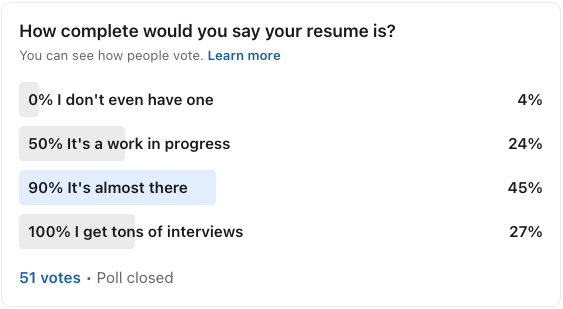
Most people want to learn how to showcase their experience
A great resume consists of many different ingredients. In addition to writing great resume bullet points, you also need to make sure your skills are highlighted, your resume is ATS-friendly, and you have a great resume summary.
The thing that people said they struggle the most, however, is how to showcase their best experience. In my resume poll:
47% of people surveyed said that showcasing their best experience was their biggest struggle
(Note: This poll only had 60 responses)
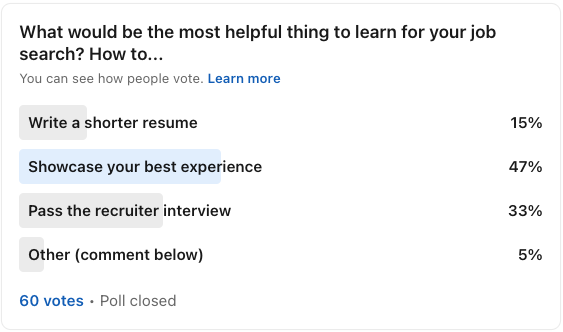
If you’re having trouble showcasing your best experience on your resume, I recommend watching Chapter 4 of our free resume course. You can get the course (for free) by dropping your email below:
People aren't sure which jobs to apply for
Another obstacle that job seekers say they struggle with is choosing which jobs to apply for in the first place. As we’ve talked about before, finding career clarity, can be especially difficult.
Career coach, Angie Callen, found out in her job seeker poll that:
33% of people surveyed said their biggest job search struggle was figuring out which jobs to apply for in the first place
(Note: This poll only had 60 responses)
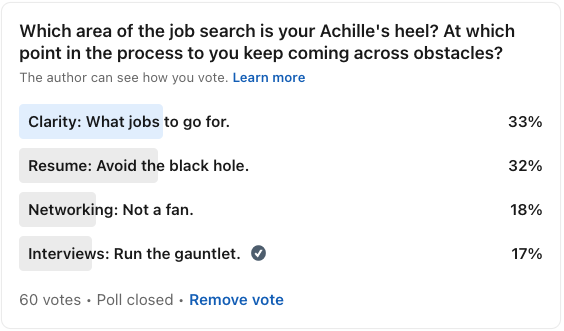
Many people use the same resume for all their job applications
Most career coaches agree that tailoring your resume for every role will generally improve your chances of landing an interview. Surprisingly, many job seekers are ignoring this best practice and using just one resume for all their applications.
Resume expert, Matt Warzel, found out the following in his resume poll:
52% of job seekers surveyed use the same resume for all their job applications even when they’re applying for different roles.
And only 41% of job seekers surveyed said they actually tailor their resumes to each role.
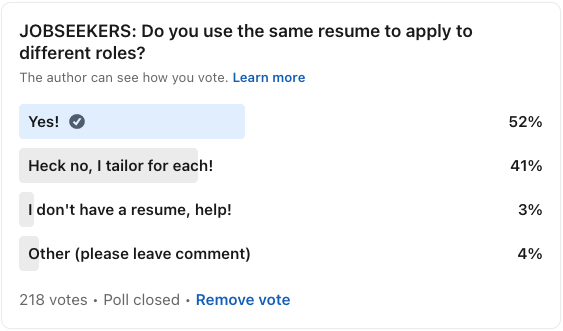
Most people have a skills section on their resume
Having a dedicated section in your resume where you list all your skills can be hugely helpful. Some career coaches believe a skills section isn’t the best strategy, but we’ve found it to improve outcomes (particularly with applicant tracking system searches).
It seems that most job seekers agree that a skills section is useful. Executive Resume Writer and Founder of Great Resumes Fast, Jessica Hernandez, found out the following in her resume poll:
84% of people surveyed said they do include a skills section in their resume
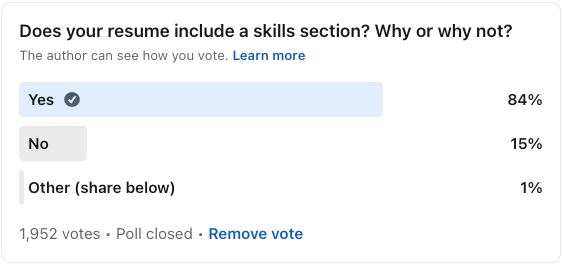
Most people send thank you notes after interviews
According to a survey by Robert Half International, 80% of hiring managers said they find thank you notes helpful in choosing a candidate.
Sho Dewan, CEO of Workhap, found out in his LinkedIn poll that most job seekers are now taking advantage of this trend:
59% of job seekers surveyed said they always send a thank you note after an interview
And an additional 31% of job seekers said they sometimes send a thank you note.
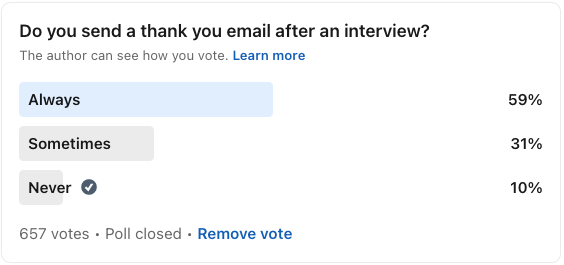
If you’d like a quick template for writing your own thank you note, you can find 3 great thank you emails to send after an interview here (along with instructions when it’s best to send one).
Cover letters still matter
Almost every year, someone asks the question, “do cover letters still matter?” To which they usually get hundreds of replies that range from “absolutely not” to “definitely yes.”
This is more a symptom of a bad question than a bad answer. We can divide this question into two better questions:
“Is a cover letter necessary?” No.
“Should you write a cover letter?” Yes.
According to the latest studies, 28% of recruiters and 90% of executives find cover letters helpful and about 49% of HR Managers say they’re a good way for a candidate to differentiate themselves.
So yes, a cover letter isn’t necessary, but it can be very helpful. BUT, it shouldn’t just be any cover letter.
We’ve found that writing a run of the mill cover letter actually doesn’t do much to improve your interview rate.
In our free cover letter course, I break down what a bad vs good cover letter looks like. Here is a video excerpt from the course:
Most people believe using family as a job reference is okay
The final step in the job search process is usually a reference check. Depending on where you are in your career stage, this can either be a simple item on your to-do list or a much bigger obstacle.
For example, if you’re early on in your career, you may not have any professional references to share yet. So, is it okay to use a family member as your job reference? Here is what people said in this career poll:
59% of people surveyed said it’s okay to use a family member as a job reference
23% of people surveyed said that it’s not okay to use a family member as a job reference
(Note: This poll only had 74 responses)
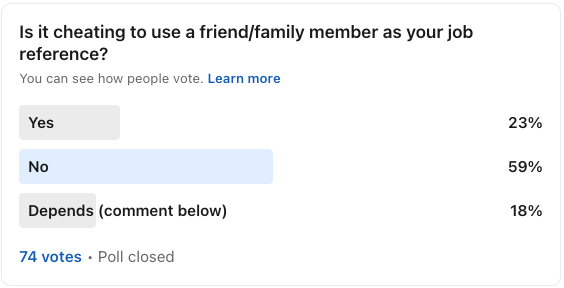
Whether you use a family member or not, asking for a job reference can be a tricky task in itself. If you want to make sure your references present you in the best possible light, this guide about how to prepare your job references may be helpful.
Hiring Trends About Salaries

A higher salary is a top “upgrade” for most people
Although learning has been correlated to bringing employees the most happiness, money is still top of mind. When asked about what “upgrade” people would prefer to have in their career for the next 5 years, here’s what they had to say:
64% of people surveyed would choose to have a $20k raise every year if given the option.
25% of people surveyed said they would choose to have 2 weeks more vacation every year.
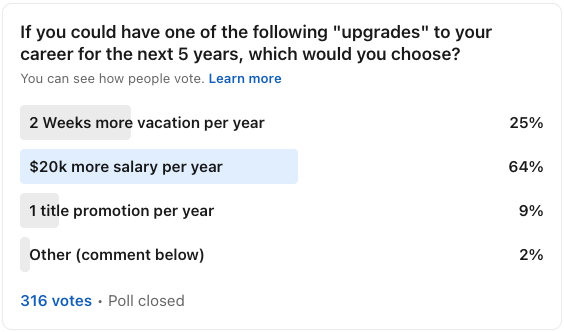
Most people have asked for a raise from their employer recently
As we continue to head into an uncertain economy, money seems to be more and more top of mind for most employees.
Andrew Seaman, Managing Editor of LinkedIn, found out that most people are actively asking for raises from their employers. Here are the results from his LinkedIn poll:
61% of people surveyed have recently asked or thought about asking their employer for a raise.
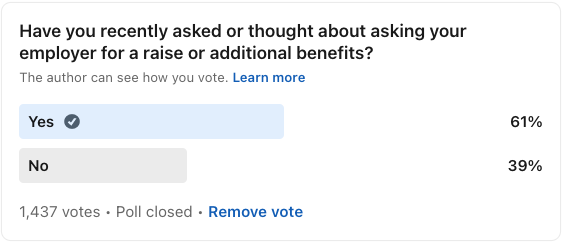
Most people aren’t willing to share their salary information with coworkers
Sharing salary information has been a very taboo subject in the U.S., but less so in other countries. According to a LinkedIn Market Resarch survey, most people are willing to share their salaries with family, but keep it private from their coworkers. The study found:
56% of people surveyed share their salary information with their family.
32% of people surveyed share their salary information with close friends.
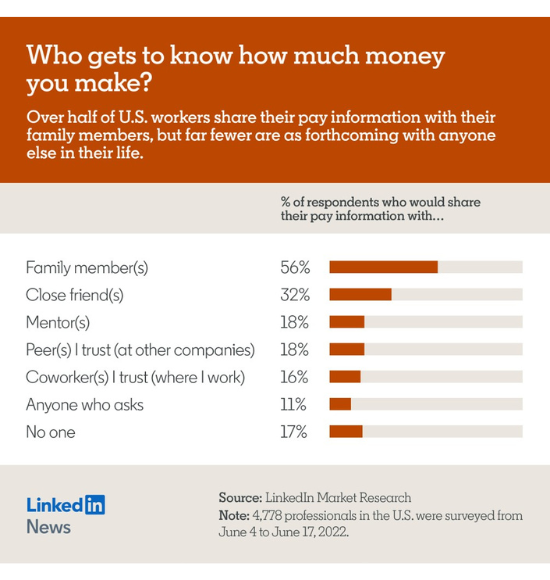
This is one of the biggest reasons why most people have a hard time knowing if they're actually being paid a fair wage.
Because so few people share their salaries within their network, many people go underpaid for years before trying to negotiate a higher salary.
Luckily, there are online salary websites now where communities are forming to share salary information. You can see a list of the best salary websites for various industries here.
Salary ranges might remain a mystery
This year, Microsoft announced that it will share the salary ranges for all their open roles in the U.S.. Other companies have also made similar announcements.
But will this trend continue or will it be a short lived fad? Sho Dewan, CEO of Workhap, asked his community what they thought in this salary poll:
42% of people surveyed believe that all companies will start sharing their salary ranges.
49% of people surveyed believe that some companies will start sharing their salary ranges, but not all.
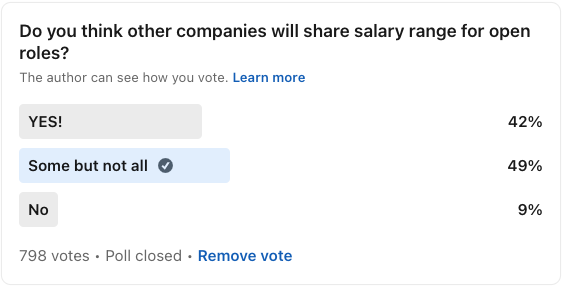
Bonus: Fun LinkedIn Polls

People find job searching harder than dating
Many people compare job searching to dating. Much like dating, when you’re job searching you’re essentially trying to show off your best self and find a suitable partner.
Although this isn’t a hiring trend per se, it was interesting to find out what people found more difficult in Sarah Johnston’s fun job search poll:
64% of people surveyed said they felt job searching is harder than dating.
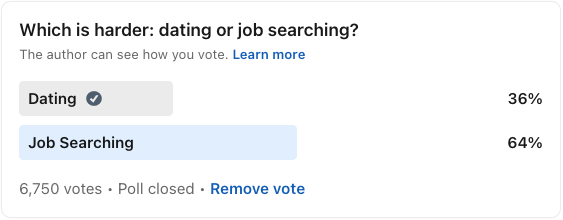
Most people want to redo the early stages of their careers
According to studies, only 27% of people end up in the same field as their college degree. As most people have realized, career journeys are hardly ever straight forward.
When I asked, “If you could redo any part of your career, which part would you redo?” here is what people had to say:
39% of people surveyed said they would like to redo early career stage between age 22–27.
38% of people surveyed said they would like to redo their post high school years between ages 18–22.
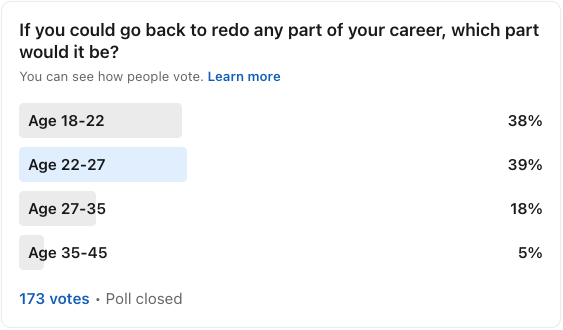
Most people believe the worst career advice is “follow your dreams”
There are thousands of posts shared on LinkedIn every year with career advice. While there is a lot of very valuable advice and people worth following, a lot of other advice can be…lackluster.
I recently asked my LinkedIn community what the worst career advice they’ve been told was. Here is what they thought was the worst career advice:
42% of people surveyed said the worst career advice is “Follow Your Dreams.”
34% of people surveyed said the worst career advice is “Just Be Yourself.”
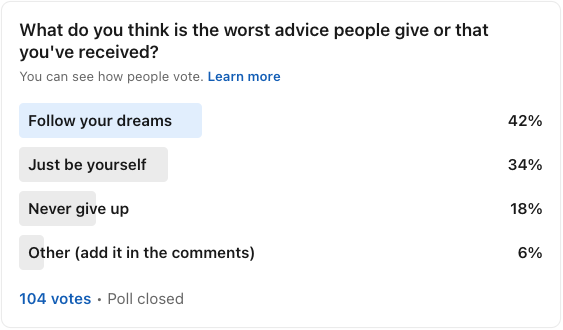
A few other notable pieces of bad career advice included the following:
Sarah Johnston, Founder of Briefcase Coach, said:
“Stay in that job that you hate — even though you have an opportunity to leave — because you don’t want to be seen as a job hopper. You really need to stay a minimum of 2 years otherwise people will think you aren’t committed.”
Maureen McCann, 15x award-winning resume writer, said:
The worst advice I’ve heard: “If you work hard and keep your head down you’ll do well here.” Um, no. That’s not the case in 2022 and probably hasn’t been true for a few decades. You have to advocate for yourself throughout your entire career. Don’t put the reigns of your future in the hands of someone else.
Virginia Franco, Executive Storyteller and former Journalist, said:
“Never say no, but instead offer an alternative.” I realize now that if I’d just said no I wouldn’t have taken on tasks that I despised.
If you’re at a crossroads in your career, I recommend reading this popular article on how to find your career calling: Are you the right peg in the wrong hole? A bit of career advice.
In a field of dandelions most people see a field of wishes
The last few years have been a very rough time. We’ve been through a global pandemic, a turbulent economy, and multiple rounds of mass layoffs.
With everything that has been going on, you might think that people are becoming ever more pessimistic (especially if you watch the news). But, of the 43 people who answered this fun poll, most people said:
In a field of dandelions, 70% said they see a field of wishes.
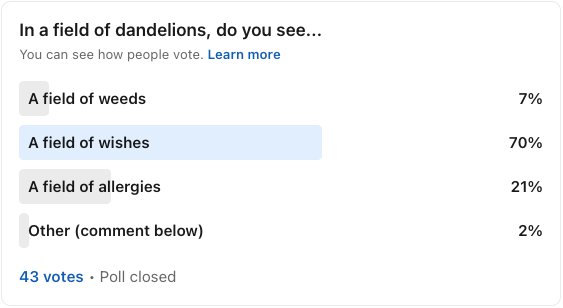
People had great snarky answers to “what’s your greatest weakness?”
There are many trick interview questions that you’ll be asked during an interview. We’ve talked about how to answer some of those tough interview questions before.
The most dreaded of these is usually, “what’s your greatest weakness?” While there is a proper way to answer this (see the above link), sometimes it can be fun to give a snarky response when appropriate. Here are a few of the best snarky responses people suggest:
Frank Spandler said his favorite response was:
“I eat other people’s food from the fridge.”
Angie Callen added:
“I like to reheat salmon in the common kitchen microwave for lunch.”
Michael LeRoy said:
“You’d have to ask my wife that one!”
Suzanne Pryor said she would channel her inner Salt-N-Pepa with:
“Girl, what’s my weakness? MEN! OK then.”
My personal favorite I’ve heard is:
“My penmanship.”
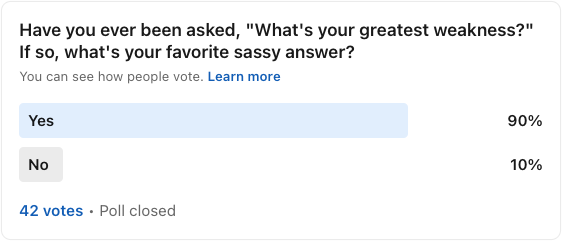
Many people would pay more than $300 for an online course
With a market that’s growing ever more competitive, and colleges becoming prohibitively expensive, a lot of people are turning to online courses to improve themselves these days.
Forbes Writer and Tubebuddy Advisor, Jon Youshaei, wanted to find out just how many people are willing to pay for online courses. Here is what he found out in his LinkedIn poll:
37% of people surveyed would spend less than $50 on an online course.
36% of people surveyed would spend more than $300 on an online course.
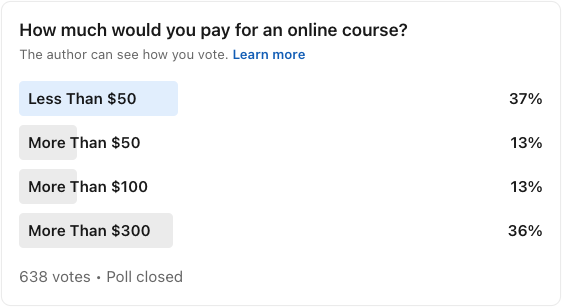
It seems that most people are pretty split on how much they would spend on an online course. Luckily, all of our courses at GHYC are free, so no need to sweat it with those.
Speaking of which, if you would like to learn more quick job search and career tips like this, you can get all of our best content for free. Just drop your email below and we’ll send them your way!
TABLE OF CONTENTS
More from the blog
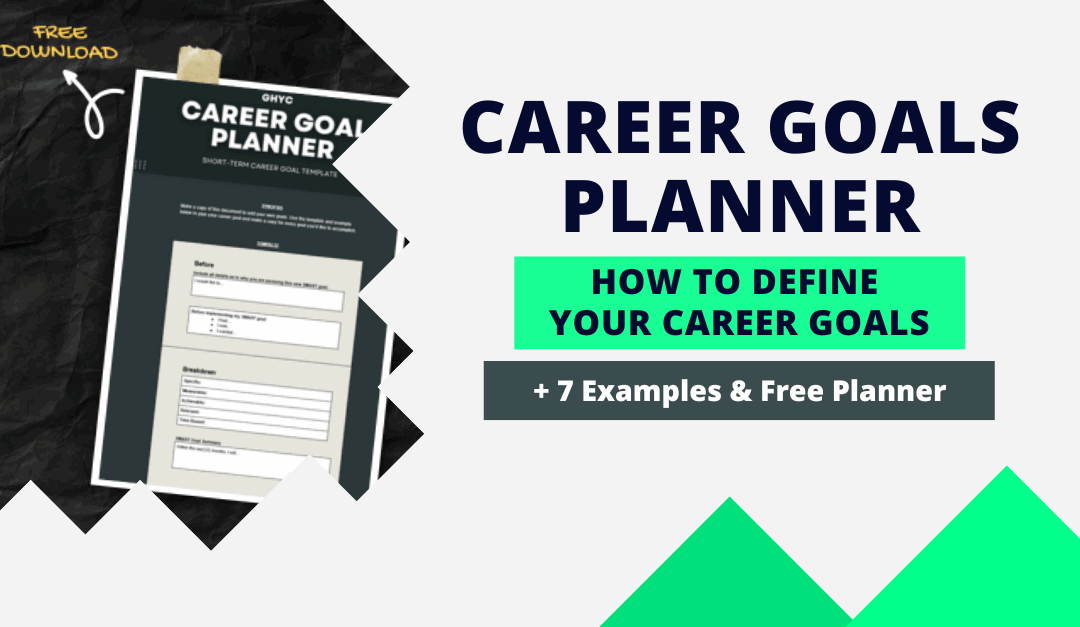
Ultimate Career Goals Planner: How to choose your career goals (+7 examples)
Ultimate Career Goals Planner: How to choose your career goals (+7 examples)A mentor of mine once...
Good Weakness for Interview: How to Craft the Perfect Answer (+10 Examples)
Good Weakness for Interview: How to Craft the Perfect Answer (+10 Examples)One of the biggest...
Top 9 Questions for Second Interviews: What to expect & how to answer
Top 9 Questions for Second Interviews: What to expect and how to answer Congratulations! 🎉 If...
Like this? Try our free courses!
Tired of sending your job applications into a black hole and never hearing back? Get hired faster with our guided courses all for FREE!
Bogdan Zlatkov is the Founder of GHYC and author of "The Ultimate Guide to Job Hunting", ranked #1 on Google. He has been featured in the Wall Street Journal, Fast Company, HR Dive, and more. At GHYC, Bogdan creates job search courses & tools by working with award-winning career coaches, best-selling authors, and Forbes-Council members. Prior to GHYC, Bogdan led the content programs at LinkedIn Learning.

